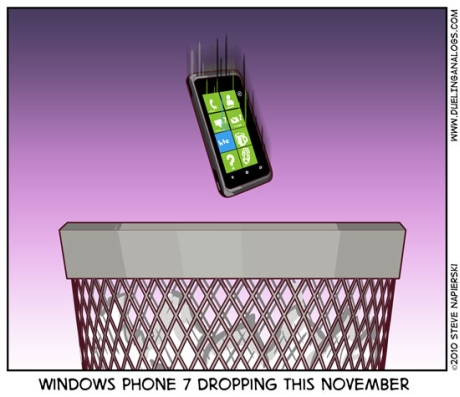Windows Phone 7: Arriving Late to the Smartphone Buffet


How many times has this happened: Someone shows up at a wedding reception, but they get there so late that the buffet has already been worked over like a zebra carcass eaten by slavering hyenas. The shrimp platter is decimated. The caviar station is empty. Nothing but gristle, fat and bone at the turkey and roast beef carving stations. The sterno is burned out, and the only rolls left are rock-hard pumpernickel. Even the crudite plate only has a few lonely pieces of wilted celery left.
Microsoft usually shows up 15 minutes later than that.
Microsoft never innovates. They sometimes improve upon others' work, or buy innovative companies outright. When they first got into the mobile computing sector, their Windows CE devices were slow, clunky, and difficult to use. They were approaching a PDA market sector that Palm Pilot had already captured and defined. The problem was that Microsoft could never wrap its corporate brain around the fact that people did not want an entire desktop OS crammed into a handheld device. Palm succeeded because its product was ridiculously easy to use.
This tone-deafness went on for years. Following iterations of Windows Mobile/Pocket PC were not easier to use. Clicking through several menus to look up a phone number was not endearing them to the people that wanted something that just worked. When Handspring brought out the Treo, it was a game changer. They married the simple Palm OS with a cellphone, showing people that the days of the old Symbian-based phones were over.
Microsoft followed suit, of course. Completely ignoring the fact that their mobile operating system was trailing far behind in sales, they married it to a number of cellular handsets from third-party manufacturers. Like a monkey flinging its feces everywhere, Microsoft made sure that their Windows mobile smartphones were available on every carrier and from every major manufacturer--except Nokia, of course, which is firmly entrenched with Symbian.
Just because it's ubuquitous in availability doesn't make it good, and sales reflected that. A recent Gartner report on smartphone usage shows that Microsoft is way down at the bottom of global smartphone market share. Microsoft simply has not been able to capture people's imaginations and wallets in the mobile market.
The same thing happened to Microsoft with the Zune. It's actually a really good mobile media device. In fact, the Zune HD is an elegant, mature device. Unfortunately, even though sales of the device have increased, it has rarely managed to capture more than 10% of the mobile media player market.
The new Windows Phone 7 operating system seems to be a complete re-working of their mobile operating system. In fact, the interface more closely resembles that of the current generation Zune devices rather than the old Pocket PC interface. They did something they claimed would never happen: they built a Zune phone OS. Customers had been telling Microsoft for 15 years that their interface was too clunky and difficult to use, and when they came up with the right kind of interface on their media player device they kept refusing to put it on a smartphone.
Now they've finally listened to their customers, and it's too damned late. The cycle begins anew at Redmond. They make a big noise about their new, revolutionary product, and then ignore it or even cancel it when they discover no one cares.
And why is it too late? It's not because their lunch was eaten by competitors. It's because THERE WAS NO LUNCH LEFT. Apple regularly sets the bar with their products. The iPhone set a new standard for smartphones. Sharp, fast, smart, elegant and easy to use. It ushered in a new generation of convergence devices and every competitor scrambled to keep up.
Google's Android operating system has become the fastest growing smartphone platform in the world, sales quickly surpassing that of Apple's iPhone. It lives up to the standard set by Apple by being functional, elegant, and easy to use, while aslo adding capabilities that Apple has not. It also isn't tied to one mobile carrier, and customers have a wide choice of handsets.
RIM's BlackBerry line still has a very large market share due to its business integration capabilities and ease of use. However, I believe that they are following the path of hubris that ultimately destroyed Palm and forced them to sell out to HP. BlackBerry's OS, even version 6, is showing its age. They are preparing to migrate to the QNX platform, but by the time they get there it might be too late. Palm took forever to move to the WebOS platform, and by the time they did it the market had already passed them by.
Symbian is still the number one handset OS in the world due to global adoption. It's been around the longest, and has adapted and updated over the years to keep up with the latest technologies. It's unlikely that Symbian will be unseated from its throne any time soon.
So now Microsoft finally has a mature, attractive product that consumers would love. It integrates social networking and media into a functional, easy to use interface. And it's too late, because the Bar Mitzvah boy already opened his presents, ate his cake and everyone is heading out to their cars to go home. The DJ and photographers have already packed up and left.
And this guy promoting it? Looks like he's already been to the buffet too many times anyway: